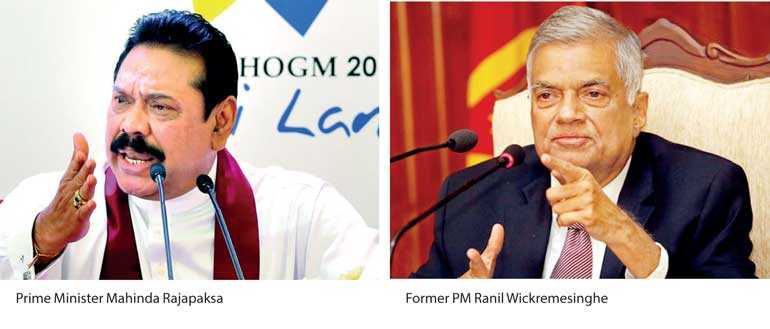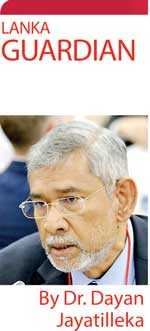Sunday Feb 15, 2026
Sunday Feb 15, 2026
Thursday, 30 January 2020 00:00 - - {{hitsCtrl.values.hits}}

There are three distinct positions on the issue of the executive presidency: abolition (the neoliberal position), full restoration by rolling back 19A (the neo-conservative position) and moderate reform, rebalancing the system, making for separation of powers and checks-and-balances as in the USA (the progressive democratic position). 19A permits and facilitates such a rebalance, but needs refinement and an upgrade through corrective ‘laser surgery’.
There were at least two main motivating factors that became ingredients in the mix that was 19A. One was the problem of the politicisation of the public service. The other was the debate over the executive presidency.
In his extensive and repeated remarks on Sri Lanka over decades, right up to the year of his death, the most sagacious of Asian statesmen Lee Kuan Yew praised Ceylon’s independent public service as one of the several factors that put it way ahead of most countries at the time of Independence. We dismantled that public service, starting with the abolition of the Ceylon Civil Service and ending with the scrapping of the independent Public Service Commission with the adoption of the 1972 Republican Constitution. 
This was one of the chickens that came home to roost in the second insurrection of the JVP. President Premadasa appointed the Presidential Commission on Youth to investigate the causes of the massive uprising (marked by barbarism) and one of the causative factors uncovered was the politicisation of the state system and process, with partisan political loyalty replacing the principle of qualifications-determined merit, especially in the arena of recruitment. Prof. G.L. Peiris who was one of the Commissioners and main drafters of its Report would recall this.
19A attempted to address the problem but in the wrong way. Instead of implementing the 1990 Youth Commission Report’s recommendations and reintroducing merit in place of political loyalty as President Premadasa had begun to do, the Yahapalana administration, dominated by its Prime Minister’s ideology of neoliberalism, infiltrated through new mechanisms, unaccountable ‘non-state actors’, some apparently with an obstructionist or ‘deconstructionist’ anti-state ideology, as veto-wielders, into the very structure of the state and the process of decision-making. This was part of the neoliberal ethos, another feature of which was the intrusive ubiquity of foreign-funded NGO lobbyists and consultants in the rooms of the legislature, conducting pedagogy for Parliamentarians. All of this was prefigured in the 2001-2003 Wickremesinghe Prime Ministership and the Berghof Foundation blueprint which Lakshman Kadirgamar found so pernicious.
19A attempted to address the problem but in the wrong way. Instead of implementing the 1990 Youth Commission Report’s recommendations and reintroducing merit in place of political loyalty as President Premadasa had begun to do, the Yahapalana administration, dominated by its Prime Minister’s ideology of neoliberalism, infiltrated through new mechanisms, unaccountable ‘non-state actors’, some apparently with an obstructionist or ‘deconstructionist’ anti-state ideology, as veto-wielders, into the very structure of the state and the process of decision-making
The earlier version of the 19th Amendment, the milder 17th Amendment sincerely introduced by Karu Jayasuriya, was also an unwieldy affair that proved irritatingly dysfunctional in wartime. The very best way to address the need for a de-politicised state sector, effecting a demarcation between state and government, is simple and straightforward: reconstitute and reintroduce the strong, independent Public Service Commission that existed before 1972. It is also the road not taken by any Government, UNP or SLFP since 1972.
Post-war, a contradiction arose between the 17th Amendment and the wartime mode of centralised decision-making and determined, effective delivery. Furthermore, President Mahinda Rajapaksa, facing subterranean succession struggles at the end of his second term which affected the ruling circles, the ruling party and the state itself, abolished term limits by means of the 18th Amendment-- which he was permitted by the Courts to do, by-passing the international norm of a referendum. This drastic change caused a backlash which as most backlashes go, gave rise to an immoderate slogan, the abolition of the executive presidency, when all that was needed was to restore the pre-18th Amendment status quo ante accompanied by the reintroduction of a streamlined 17th Amendment.
The original draft of the 19th Amendment submitted by Prime Minister Wickremesinghe in Parliament virtually abolished the elected executive presidency and transferred power to the PM. There was some confusion in the ranks of the Mahinda Rajapaksa-led Joint Opposition camp, with some senior SLFPers (later, top SLPPers) as well as New Right columnist-ideologues arguing for abolition on the grounds that President Sirisena who contested the Presidential election as a defector from the SLFP was the main enemy. Others stressed dogmatically that the abolition had long been the stand of the centre-left. Still others belonging to the burgeoning New Right outside the JO argued that the Presidency conferred too much influence on the minorities whose votes could swing a presidential election.
Prime Minister Wickremesinghe was striving to swing the support of the MR-led JO in favour of abolition, and actually counting on it. I strongly opposed the move, arguing so relentlessly against it that Wickremesinghe attacked me by name, twice, in his two-hour TV interview given to ‘civil society influencer’ Sannasgala on the first anniversary of his assumption of the Yahapalana Prime Ministership. With some considerable encouragement from me, Udaya Gammanpila filed a case against the PM’s draft of 19A in the Supreme Court, which rightly struck down several clauses and noted that several others would require not only a two-thirds majority in Parliament but also a referendum.
When Prime Minister Wickremesinghe’s 2015-2016 constitutional power grab was provisionally stymied by the Supreme Court, the JO had two options. Either oppose 19A frontally and vote against it, in which case they would be outvoted because President Sirisena’s SLFP wing would vote with the UNP, or work with the Sirisena SLFP and neutralise the UNP leader’s political neoliberalism. This was the path that the JO parliamentary leaders correctly adopted. The 19A that was actually passed by Parliament was the result of that pragmatic compromise. Wickremesinghe criticised it in his speech and pledged to expeditiously resume the push for full abolition. The abolitionist attempt did resume, keyed into the polarising blueprint for a new, non-unitary, quasi-federalising Constitution, which proved to be rocket fuel for the successful Sinhala nationalist surge.
A two-thirds mandate at the Parliamentary Election is not a necessary condition to repeal clauses of 19A or even 19A as a whole. President Sirisena was not reinforced by a two-thirds majority at an election, when he introduced the 19th Amendment. The two-thirds majority was temporarily stitched together by him through brisk, untiring dialogue and skilful negotiation. The necessary retooling of 19A can be readily undertaken by the same method. However, what a two-thirds majority would do is remove the cruise control from a sweeping neoconservative constitutional counterreformation beginning with the rollback of 19A, encompassing the entire ensemble of power relations including between centre and periphery and the three branches of government; triggering a qualitative shift in the ratios of power resulting in ‘monism’ and unipolarity, accompanied by the unilateral ideological reformatting of the undergirding Social Contract and redefinition of the essential character of the Sri Lankan state
What was wrong with the Yahapalana experiment had little or nothing to do with 19A. It had everything to do with the impossibility of the centrist-moderate SLFP striving to co-exist, not with a centre-right moderate UNP but an outrageously, irredeemably neoliberal globalist one led by the Prime Minister. This is amply proved by the fact that even without 19A and well before it, a cosmopolitan liberal SLFP President, Chandrika Bandaranaike Kumaratunga, felt the socio-political and strategic situation to be so intolerable that she tossed out Prime Minister Wickremesinghe in late 2003. The electorate completed the task by defeating him in 2004 and 2005 at the Parliamentary and Presidential Elections. Voters re-elected him to the post of PM only in 2015, almost one-and-a half decades after he was first elected in 2001.
It is the nexus with Wickremesinghe who has remained UNP leader since the mid-1990s right up to the present time when populist and/or nationalist tides have deposed neoliberal elitist-globalist Old Guard leaders on every continent, that proved fatally toxic to the liberal nationalist Sirisena Presidency, disintegrated the historic SLFP just as it has eaten corrosively into the electoral entrails of the UNP itself, and most dangerous of all, thereby hollowed out the competitive two-party system with its broad moderate centre. The 19th Amendment had little to do with it.
It is necessary to remove those neoliberal features of 19A which are anomalous or dysfunctional, but not its positive provision of democratic checks and balances and where it prevents unipolarity and monism in a system. The elected President should surely be vested once again with the portfolio of Defence, representing as he does a majority of the country as a whole. On the issue of term limits all that is necessary is to introduce the word “consecutive”, which would mean that no President shall serve more than two consecutive terms.
There is no good reason to reduce the powers of the Prime Minister. In his watershed speech of 15 January, President Putin, a personification of strong leadership and iconic regenerator of a strong state, made the case for a considerable shift of power from the Presidency – not its abolition—to the legislature, the Prime Minister, the Chairman of the Senate and a prospective new State Council.
The ‘Bring Back Mahinda’ strategy was targeted at making him PM precisely because that post had been empowered by 19A. Abolition of 19A would negate that entire political Movement and struggle, flipping its achievements. The overturn of 19A now would weaken the current Prime Minister with whom the newly elected President has and can have no contradictions of the nature and magnitude that existed between SLFP Presidents Chandrika Kumaratunga and Maithripala Sirisena on the one hand and UNP Prime Minister Wickremesinghe on the other.
The scenario of zero-sum deadlock is a false scare. In the USA it is often the case that the Presidency and at least one of the two Houses of the bi-cameral legislature are controlled by rival parties. It is in France that the term “cohabitation” was coined to deal with a situation in which the Parliament and Presidency were dominated/occupied by different parties.
A two-thirds mandate at the Parliamentary Election is not a necessary condition to repeal clauses of 19A or even 19A as a whole. President Sirisena was not reinforced by a two-thirds majority at an election, when he introduced the 19th Amendment. The two-thirds majority was temporarily stitched together by him through brisk, untiring dialogue and skilful negotiation.
The necessary retooling of 19A can be readily undertaken by the same method. However, what a two-thirds majority would do is remove the cruise control from a sweeping neoconservative constitutional counterreformation beginning with the rollback of 19A, encompassing the entire ensemble of power relations including between centre and periphery and the three branches of government; triggering a qualitative shift in the ratios of power resulting in ‘monism’ and unipolarity, accompanied by the unilateral ideological reformatting of the undergirding Social Contract and redefinition of the essential character of the Sri Lankan state.
[Dr. Jayatilleka was Ambassador Extraordinary and Plenipotentiary of Sri Lanka to the Russian Federation. Earlier he served as Ambassador Extraordinary and Plenipotentiary of Sri Lanka to France, accredited to Spain and Portugal, and Permanent Delegate of Sri Lanka to UNESCO (2011- 2013). During the last war he was Permanent Representative/Ambassador of Sri Lanka to the United Nations at Geneva (2007-2009). He was elected Chairman of the Governing body of the ILO (2007/2008) and Vice-President of the United Nations Human Rights Council (2007/2008).]